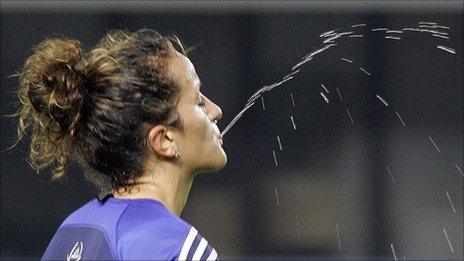Should spitting in the street be banned?
- Published
- comments

Elite and amateur athletes often say they need to spit
For many, seeing someone spit in the street is unpleasant, but one councillor is going as far as demanding it be outlawed. So is spitting ever justified, asks Tom de Castella.
A few centuries ago spitting in the street was as normal as tipping your chamber pot out of the window.
Today "flobbing" or "gobbing" as it's colloquially known, is considered by many to be ugly, anti-social and potentially disease spreading.
And yet it's a taboo that is regularly broken by people with a mouthful of phlegm. Some like England footballer Wayne Rooney - who was accused in October 2008 of spitting at a photographer - use spitting to show contempt.
But while spitting at people is manifestly unacceptable, the mere act of spitting on the pavement is not so clear-cut. For some, it's socially acceptable, for others it is a gruesome piece of anti-social behaviour.

Tiger Woods and Wayne Rooney have both been criticised
Now the problem has come to a head with a north London councillor calling for spitting in public places to be banned. Councillor Chris Bond, Enfield Council's cabinet member for environment, has asked Justice Secretary Ken Clarke to let local authorities introduce by-laws prohibiting the practice.
Until 1990, spitting was an offence carrying a £5 fine and Bond wants the new ban to be enforced by litter wardens.
"It is my belief that most people find spitting a wholly obnoxious, filthy habit which can spread germs and causes health issues," Bond says.
"Banning spitting in Enfield will help combat tuberculosis which has been on the increase in London."
So is spitting unhealthy?
During the 1940s, when tuberculosis was widespread it was common to see "Spitting Prohibited" signs on the buses, says Sir Hugh Pennington, emeritus professor of bacteriology at Aberdeen University. "TB was still very common. The signs were justified for a packed bus where everyone was smoking and coughing. But the situation's changed - the rate of TB has dropped like a stone."
It's theoretically possible for a lump of spit on the pavement to spread TB, he says. The spit would have to contain the tubercle bacillus and dry out of sunlight, which kills the bacteria.
The particle would need to be blown into the air while the sample was still fresh and be inhaled directly into someone's lung. Such a scenario is highly unlikely - these days TB is rare and the saliva is more likely to be washed away by the rain or destroyed by ultraviolet rays.
What is much more dangerous than spit, is vomiting in public, which can pass on the far more infectious norovirus, Professor Pennington says. "The councillor's right to say spitting is a nuisance like people urinating in the street. But it's not a public health issue."
But the health issue is not what the opponents of spitting are necessarily concerned about.
Simon Fanshawe, author of The Done Thing, praises Bond for taking a stand against an ugly habit. "Well done him. None of us like being spat at."
But still it's hard to put one's finger on exactly why many people find spitting so repugnant. In China and Turkey there is no problem with spitting in public, it's simply a convenient way of removing something unpleasant from one's mouth.
Part of the problem with spitting is the showing off, Fanshawe says. With a guttural growl we summon up a perfect specimen of hockle before launching it grenade-like to some unseen target across the pavement.
"Spitting in the gutter or grate is not so bad. What people object to is the casual spraying around of saliva, doing it without thought for people's feelings," he says. Before the advent of sewers everyone spat in the street, he acknowledges. "Victorian cities just stank - people vomited, urinated and spat in the street. We've got rather genteel since then and locked away our bodily functions."
Fanshawe feels our newfound gentility is a function of our more developed society and people should respect our more fastidious sensibilities. And new rules, like the introduction of quiet coaches on trains, might help but the crucial aspect is a sense of public outrage, he argues.
"The best way to stop spitting is for the good citizens to confront people and say 'excuse me would you mind not doing that please?' The police certainly haven't got the time to stop it," he says.
And at the moment it's only sportsmen like Rooney and golfer Tiger Woods - caught on camera in February's Dubai Desert Classic - who are publicly shamed for spitting.
But Woods was defended by American commentators. Many amateur athletes, especially joggers, can be seen spitting out a mouthful of saliva in the street. So do we need to cut them some slack, and therefore think hard before an absolute ban?
John Brewer, professor of sport at Bedfordshire University and a keen marathon runner, says there's a reason many runners spit. Running at a modest pace a jogger will breathe in and out 150 litres of air every minute, he says. "That inevitably dries the mouth. And while some runners deal with it by swallowing others find that it's better to spit out that dry saliva."

The way spitting is viewed has changed over time
But Brewer urges runners to think twice before they spit. "It's not the most socially endearing of habits that will put runners in a good light. So if you really need to spit do it into a handkerchief or if you haven't got anything one, do it into your T shirt. There's always a way to avoid flobbing onto the pavement."
But for David Castle, editor of Running Fitness, people need to keep a sense of proportion. "I'll own up and say I'm a spitter. I don't see it as a problem. I've run for 30 years and think it's just part and parcel of running."
When you're exercising you build up an excess of saliva and sometimes that means spitting, he argues. As long as you direct the saliva towards the ground rather than in someone's face there's no problem, he believes. But context is all.
It may be okay for runners but spitting in the street is forbidden for the humble pedestrian, he adds.
And as long as there is ambiguity, the disgusted beholders may be left waiting for their crackdown.